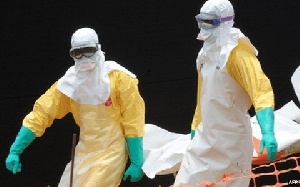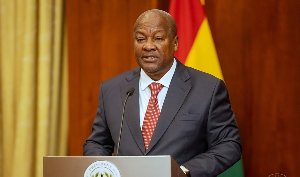An infection Control expert says Ebola can be prevented if basic hygienic, infection control and triaging practices are strictly adhered to in all health facilities.
Triaging is the process of determining the priority of patients' treatments based on the severity of their condition. This rations patient treatment efficiently when resources are insufficient for all to be treated immediately.
“Ebola can be prevented through patient isolation, rapid investigations, basic hygienic practices and infection control measures, Dr Nana Ayegua Hagan Seanedze who also doubles as a public health practitioner said at an Ebola Training Programme for health workers in Accra.
It was organised by the Greater Accra Branch of the Ghana Medical Association to sensitize health practitioners in the Region.
Infection control requires funding and strict adherence to infection control, she said, and added that anything short of that could be disastrous for a facility and its workers.
Health workers are scared of Ebola because we are not doing the right things in infection prevention, disposal of sharp object and basic hygiene, such as hand washing which she said was a skill.
Dr Hagan Seanedze said health worker should insist that few relations accompany a patient with suspected symptoms, and ensure safe disposal of patient care items and bodies when death occur.
Hospital management should make room for holding bays, put in place security team to protect workers from being attacked by relatives whose relation may be quarantined, a taskforce to determine cases of Ebola and a case management team to attend to Ebola patients she said.
Dr Oliver Commey, a Public Health Physician, said the nation was not prepared because of lack of communication but however noted that apart from the global response, Ghana was also putting in place measures needed to contain the pandemic should it enter the country.
Some of the measures include an instituted Inter Ministerial Committee Kotoka Airport surveillance, 14 out 50 entry points equipped to screen, building of treatment centres, radio and television discussions, leaflets and poster, message to religious leaders, media briefings and sensitization of health directors.
This is to be followed by World Health Organisation (WHO) training for health workers by end of August which would be replicated in all regions across the country.
There were still more to done, he said and noted that there was the need for a rapid response team, case management and monitoring teams and an urgent activation of surveillance.
He charged health worker to play their roles effectively by providing supportive care to decrease mortality, and ensure that before a patient leaves the hospital, he should be free from the symptoms for three days meaning there should not be no presentation of the viral particles in the body.
According to him the virus can be activated in semen for seven weeks and a month in lactating mothers and noted that it would be expedient for health workers to alert such category of patient to abstain from sex and breastfeeding to prevent infecting others.
“Unless your personal protective and hygienic practices are poor it would be difficult for any health worker to contact Ebola. Ignorance can kill and create unnecessary fear and panic,” he told his colleagues.
Dr Philip Amoo, head of Public Health Unit, Korle Teaching Hospital who spoke on the epidemiology of disease said the scope and scale exceed the capability of any government but calls for concerted efforts from all agencies and countries.
He said fruits bats are said to be a carrier of Ebola and spread to other bush animals which are delicacies for some human beings and intend spread to humans through contact.
Symptoms of the disease is fever (greater than 38.6°C or 101.5°F), severe headache, muscle pain,weakness, diarrhea, vomiting, abdominal (stomach) pains, and lack of appetite and may appear anywhere from 2 to 21 days after exposure.
He explain that health workers should protect themselves and also be cautious of the disease case definition and packing, before sending specimen to Nogouhi Memorial Institute for results, to minimise waste in the use of regents as well not to create fear and panic.
Dr Ernest Yorke, Chairman of the Greater Accra Association of the GMA said though government was putting in place measure to contain the disease should it enter Ghana, it should do more to train and protect front line workers and have a workable work plan.
“To my fellow health workers, please avail yourselves to educational programmes to improve your knowledge and preparedness towards the disease and engage your employers constructively to provide the necessary logistics to be able to manage the disease if it comes to your facility,” he said
Dr Obeng Apori, Director of the Ridge Hospital who chaired the programme, lauded the GMA initiative and asked heath worker to stop the fear and panic and noted “ if those at the fore front are afraid and not well informed we are doomed”, and added that with God all thing were possible and that Ghana will overcome.
Health News of Saturday, 23 August 2014
Source: GNA













